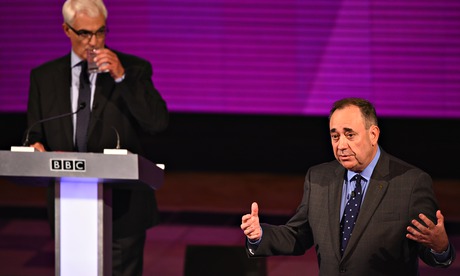 |
| The poll followed an ill-tempered referendum debate in which Salmond forced Darling onto the back foot. |
Alistair Darling defeated by a 71% to 29% margin, according to Guardian/ICM poll of Scots who watched the debate
Alex Salmond emerged as the clear winner of the second Scottish independence debate, besting Alistair Darling by a 71% to 29% margin, according to an instant Guardian/ICM poll of Scots who had watched the debate.
Salmond will be delighted to decisively overturn the verdict in the first round, in which a similar ICM poll found Alistair Darling had won by 56% to 44%.
The poll followed an ill-tempered referendum debate in which Salmond forced Darling onto the back foot on the currency, the NHS and Labour's decision to partner with the Conservatives in the Better Together campaign against independence.
The headline figures exclude viewers who say they don't know who won the debate – with these included the figures are 65% for Salmond, 26% for Darling, and 9% who were not sure.
As in the first debate, Alex Salmond was deemed to have the "more appealing personality", this time enjoying an 54% to 32% advantage on this count. But the difference this time came on the question of who had the best arguments. While Darling had the advantage last time around, this time Salmond leapt ahead to take a commanding 56% to 36% lead.
Morale in the yes camp will be boosted by the extraordinarily emphatic win that Salmond notched up among those who had gone into the evening planning to vote for independence – 98% of those expressing a view gave it to the first minister, and only 2% to Darling. In contrast, things were much more balanced among no voters – 59% gave Darling the edge, but a substantial 41% felt Salmond had the better night.
ICM weighted the sample to representative of the Scotland population by age, gender, region and previous voting behaviour (reported 2011 vote for the Holyrood election). But it is important to bear in mind that this is a survey of voters who actually watched the debate, as opposed to the electorate as a whole. Going in to the debate, this sample was more pro-independence than most polls of voters as a whole have suggested – splitting 44% yes to 46% no with 10% not sure. Over the course of the debate, there was little change in this balance. The don't knows dropped back two percentage points to eight, while both yes and no edged up one each to 45% and 47% respectively as a fraction of viewers made up their mind.
ICM pre-recruited a sample of 1,155 people who said they would be watching the debate live and who agreed to complete the survey immediately afterwards, which they were duly sent. All participants were recruited from ICM's own online panel plus those of two of the biggest suppliers of Scottish panel in the market research industry. The post-debate survey data is based on 505 completed interviews. ICM is a member of the British Polling Council and abides by its rules.
SOURCE: The Guardian

0 comments:
Post a Comment